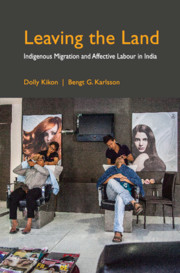6 - Talking about Method
Published online by Cambridge University Press: 04 May 2019
Summary
DK:I think it is important for us to reflect on the migration project we started in 2013. The chapters we ended up writing are deeply ethnographic and describe the lives of young indigenous migrants. What was your experience? I ask this because we were working together in many places but at the same time we were also travelling to different cities and meeting groups of migrants.
BGK:It might sound strange, but the topic of migration does not come easy for me. I still feel kind of reluctant or hesitant about it. I mean in my department in Stockholm, migration is one of the key issues discussed; almost everyone engages with it in one way or another. Its effect is there all around us. But I have stayed away from it; I have not felt the compulsion to engage with it myself. Perhaps, I take it as something rather self-evident; I mean, it is as if you know beforehand why people move, nothing that requires years of research. Some leave to escape war, conflict, poverty, natural hazards, oppressive regimes, or miseries of various kinds, yet others to seek out new opportunities or fulfil aspirations and dreams. But of course, once you get into it, it grows on you and as pointed out in the chapters of this book, migration becomes endlessly more intricate, challenging, and exciting. It is as if you have to approach it sideways, as I recall Slavoj Žižek's writing about violence (Žižek 2008). I guess there is also something about my own sensibility, the fact that there is something inherently sad about it, which also kept me away from migration studies. Leaving a place is always leaving behind loved ones, family, people you grew up with, sites, and relations forged over time and that have made you what you are. Mayori, one of Nandita Haksar's (2016: 240) interlocutors, told her after reading the draft manuscript of the book, ‘I did not realize how sad our lives are.’ Something always seems to be lost in the transition. And this, I think, holds true more generally. Just think of our own journeys or histories of mobility.
- Type
- Chapter
- Information
- Leaving the LandIndigenous Migration and Affective Labour in India, pp. 113 - 128Publisher: Cambridge University PressPrint publication year: 2019



